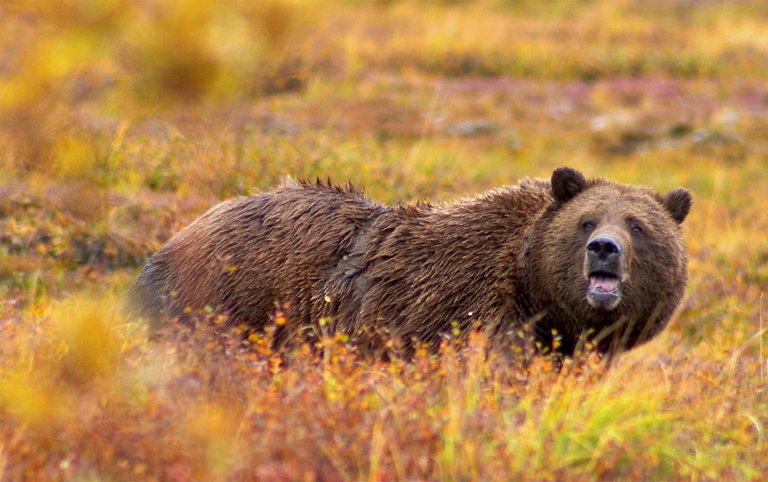The Greater Yellowstone Ecosystem is one of the largest intact ecosystem in the northern temperate zone, located within the northern Rocky Mountains in USA. The area is probably most known for housing the first created national park; the Yellowstone National Park, which is a huge tourist attraction for people from all over the world.
Grizzly Bears (Ursus arctos horribilis) were once abundant in the Greater Yellowstone Ecosystem, but the population fell rapidly during the 1900s, with the lowest number being at around 176 bears alive in 1970. This made the US Government take action, and the grizzly bears of the Greater Yellowstone Ecosystem became considered endangered, and efforts were put into place to increase the population.

A grizzly bear (Ursus arctos horribilis). Image by Jean-Pierre Lavoie, posted with the Creative Commons Attribution-Share Alike 3.0 Unported license.
Conservation biology tend to have many more failure stories than success stories, so I think sharing this huge conservation win is a good thing to do. One day ago, the U.S. Secretary of the Interior Ryan Zinke announced that the grizzly bear population in the area had reached over 700 individuals. This number is high enough that the population is stable and sustainable, and will most likely be able to keep the numbers up without human conservation efforts.

The Greater Yellowstone Ecosystem. Image by Daniel Mayer, posted with the Creative Commons Attribution-Share Alike 3.0 Unported license.
This is a big accomplishment for the people who have worked on the grizzly bear conservation efforts, and Ryan Zinke said that it’s “one of America's great conservation success stories”.
Some groups have serious concern about the removal of the endangerment status, despite the stable grizzle bear population. The Sierra Club, a nonprofit environmental organization are very skeptical about this removal, and thinks the grizzly bears would have a more safe future if they were kept on the endangered population list. Their main point of argument is that we have no insurance of their continued survival if we no longer monitor the population, which is of course true. It makes a lot of sense, but monitoring a population that is stable is also considered a waste of money by many people.
Despite some controversial, I find this news very exciting, and hopefully the population will keep on being stable in the future. Humans are the ones responsible for the decline of bears all over the world, so it is great that we are able to keep at least some populations in high numbers!
Thanks for reading, and make sure to leave a comment below if you got any questions or opinions :)
click here!This post received a 2.0% upvote from @randowhale thanks to @valth! For more information,
I love Bears <3
Very informative your article. I will follow you because I love nature and you are gifted in writing. Good work bravo
Thanks for both the nice words and the follow :)
Follow back
Very informative post..
Grizzly bear mostly found in canada and deosai plains pakistan
great article. 700 bears isn't very many at all, and from what i've read this population is only stable and sustainable because of the protection its been under and removing its endangered status translates to removing its protections. it would be really sad to see a conservation success story turn into another failure.
To be honest I'm not exactly sure what the removal of the status will do for the species. I still think the bears will have some sort of protection, and from what I understand only the active part of the conservation work will stop. I don't think it will be legal to hunt them etc. anyway.
I think 700 bears are pretty many for a single region. My own country (Norway) is considered to have a pretty OK bear population, but we only have between 120 and 170 grown bears living here. Remember that these are large animals that each have a huge home range that they will defend from other bears.
Cool! Though this is one of many examples where having animals removed from the list can be pretty devastating to them. It's such a complicated process...
Happy to follow another nature lover!
Thanks! Yeah, being removed from the list can definitely have consequences. I do however hope that they will be able to stay at stable numbers despite their removal.
thanks.very good post. upvoted & following u. looking forward to your next post. hope uwill like my this post. pls upvote it. https://steemit.com/science/@ika497/do-you-want-to-test-your-intelligence-6-pictures-to-test-your-intelligenece-have-fun